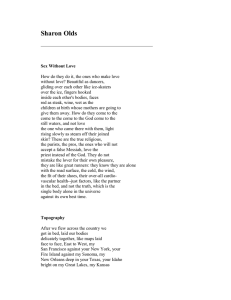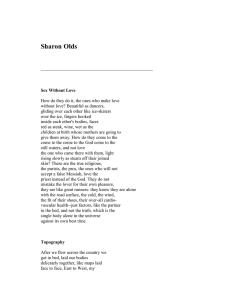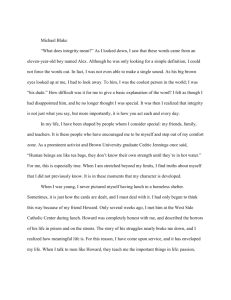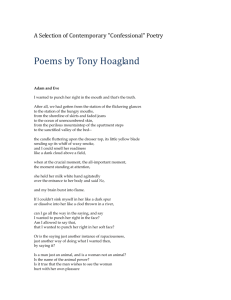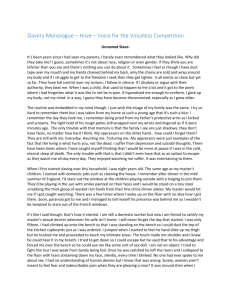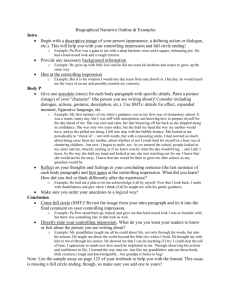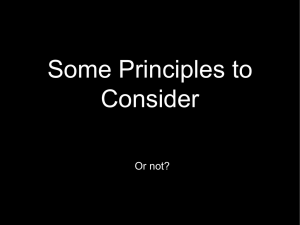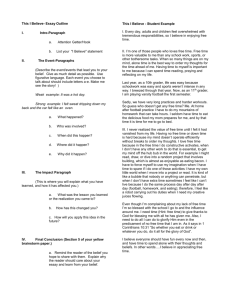Contemporary Confessional Poetry by Hoagland & Lewis
advertisement
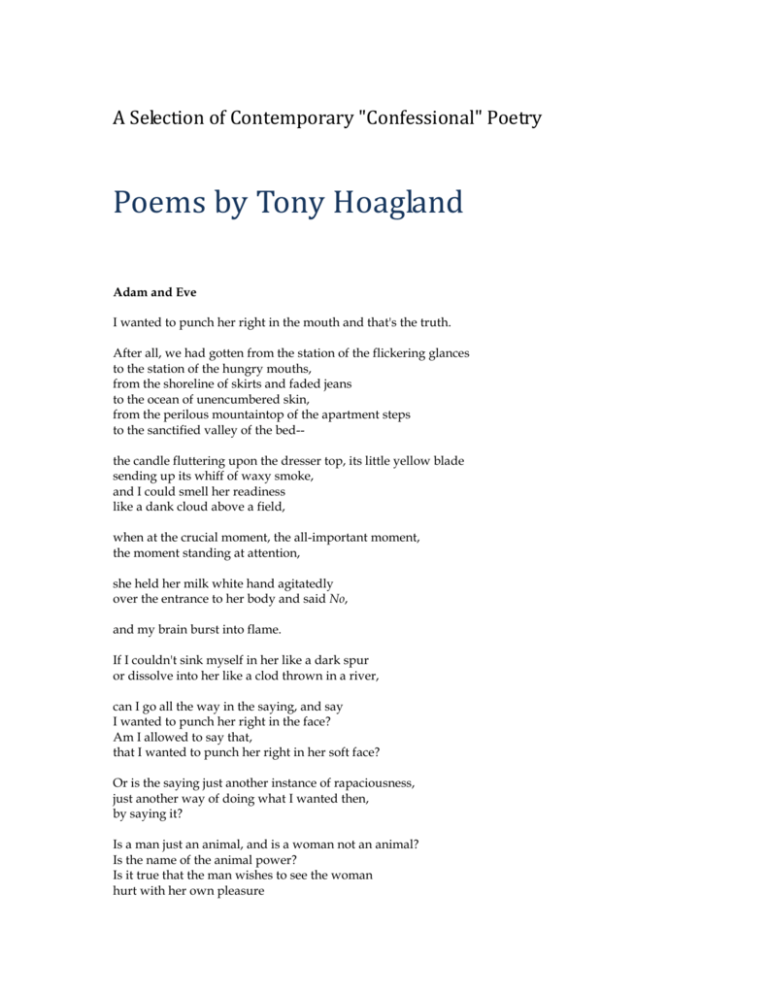
A Selection of Contemporary "Confessional" Poetry Poems by Tony Hoagland Adam and Eve I wanted to punch her right in the mouth and that's the truth. After all, we had gotten from the station of the flickering glances to the station of the hungry mouths, from the shoreline of skirts and faded jeans to the ocean of unencumbered skin, from the perilous mountaintop of the apartment steps to the sanctified valley of the bed-the candle fluttering upon the dresser top, its little yellow blade sending up its whiff of waxy smoke, and I could smell her readiness like a dank cloud above a field, when at the crucial moment, the all-important moment, the moment standing at attention, she held her milk white hand agitatedly over the entrance to her body and said No, and my brain burst into flame. If I couldn't sink myself in her like a dark spur or dissolve into her like a clod thrown in a river, can I go all the way in the saying, and say I wanted to punch her right in the face? Am I allowed to say that, that I wanted to punch her right in her soft face? Or is the saying just another instance of rapaciousness, just another way of doing what I wanted then, by saying it? Is a man just an animal, and is a woman not an animal? Is the name of the animal power? Is it true that the man wishes to see the woman hurt with her own pleasure and the woman wishes to see the expression on the man's face of someone falling from great height, that the woman thrills with the power of her weakness and the man is astonished by the weakness of his power? Is the sexual chase a hunt where the animal inside drags the human down into a jungle made of vowels, hormonal undergrowth of sweat and hair, or is this an obsolete idea lodged like a fossil in the brain of the ape who lives inside the man? Can the fossil be surgically removed or dissolved, or redesigned so the man can be a human being, like a woman? Does the woman see the man as a house where she might live in safety, and does the man see the woman as a door through which he might escape the hated prison of himself, and when the door is locked, does he hate the door instead? Does he learn to hate all doors? I've seen rain turn into snow then back to rain, and I've seen making love turn into fucking then back to making love, and no one covered up their faces out of shame, no one rose and walked into the lonely maw of night. But where was there, in fact, to go? Are some things better left unsaid? Shall I tell you her name? Can I say it again, that I wanted to punch her right in the face? Until we say the truth, there can be no tenderness. As long as there is desire, we will not be safe. Lie Down with a Man In those days I thought I had to do everything I was afraid of, so I lay down with a man. 2 It was one item on a list-sleeping in the graveyard, under the full moon, not looking away from the burned girl's stricken face, strapping myself into the catapult of some electric blue pill. It was the seventies, a whole generation of us was more than willing to chainsaw through the branch that we were sitting on to see what falling felt like--bump bump bump. Knowing the worse about yourself seemed like self-improvement then, and suffering was adventure. So I lay down with a man, which I really don't remember except that it was humorless. Curtains fluttered in the breeze from the radio's black grill. Van Morrison filled up the room like astral aftershave. I lay my mass of delusions next to his mass of delusions in the dark room where I struggled with the old adversary, myself --in the form, this time, of a body-someplace between heaven and earth, two things I was afraid of. Rap Music Twenty-six men trapped in a submarine are pounding on the walls with a metal pipe, shouting what they'll do when they get out. Or they are rolled up in a rug in the back of a rug truck that has wrecked. No, it's the car pulled up next to mine in traffic with the windows rolled down and the sound turned up so loud it puts everything in italics: enough to make the asphalt thump and the little leaves of shrubbery in front of the nice brick houses quake. I don't know what's going on inside that portable torture chamber, 3 but I have a bad suspicion there's a lot of dead white people in there on a street lit by burning police cars where a black man is striking the head of a white one again and again with a brick, then lifting the skull to drink blood from the hole— But that's what art is for, isn't it? It's about giving expression to the indignation— it's for taking the in out of the inhibitchin; so maybe my ears are just a little hysterical or maybe my fear is a little historical and you know, I'd like to form an exploratory committee to investigate that question— and I'd like that committee to produce a documentary called The Sweet Sounds of Afro-American, but all this ugly noise is getting in the way, and what I'm not supposed to say is that Black for me is a country more foreign than China or Vagina, more alarming than going down Niagara on Viagra— and it makes me feel stupid when I get close like a little white dog on the edge of a big dark woods I'm not supposed to look directly into and there's this pounding noise like a heartbeat full of steroids, like a thousand schizophrenic Shakespeares killing themselves at high volume— this tangled roar that has to be shut up or blown away or sealed off or actually mentioned and entered. Two Poems by Lisa Lewis February This is the second month of the year I turn thirty-seven. Already the weather is warming in southeast Texas, rushing The weeks along; the trees have to work to keep up. One day I'll look over my head and the elm will be leafed out, 4 And then it will be summer. And probably I'll be working On my birthday, probably teaching a couple of classes, And I'll say to myself, it's just as well, who needs to think about Turning thirty-seven, and I'll go back to my regular life, Smiling and talking to students in the hallway, Breaking a sweat on the short walk from the door To the parked car, rolling all the windows down But not without glancing at the sky for storm clouds, Because a storm will be breaking every day then after noon, Lasting about an hour, and subsiding back to sun. You learn Such things about the weather when you've lived in a place For a while. Or maybe it's really what some people say, It's like that everywhere; I haven't been anywhere near Everywhere, and maybe I'll never make it. But there were years when I liked to search out danger, Late nights I learned each secret worn-out cars Bouncing through the ruts of logging roads could take me to. I learned about love like that; the full moon pierced The windshield like a spike and I knew it was love When the strong, agile boy above me sighed And pushed deeper inside me. I knew it was love When I didn't want to close my eyes. I learned about trouble And I knew it was trouble when I dropped out of high school My senior year and took to prowling the roads with boys; We took to shooting heroin under the spring sky, We'd lie back together in the roadside grass and all let go Of our suffering, we were having a hard time growing up, It felt good to do a terrible thing together. No one could find us there. No one was looking. We would've counted the stars, but that was work. Instead we talked about loving one another, and I guess You'd say it was the heroin talking, but we thought we felt it, We were free together, we knew how we were when no one Could know us because we were doing evil. I took myself Far from those foothills the first chance I could. I didn't find out what became of my friends, it looked like Some of them were headed for prison; I loved them once But I wouldn't love them now, and I didn't want to Think about mixing love and trouble, the trick I learned And never gave up; I just got older, and stopped Getting into the trouble of the young; I discovered The trouble of the older. This is the second month Of the year I turn thirty-seven. Already the little fists Of leaves are forming inside the knotted ends of twigs 5 All over Houston. The cold weather is over. This winter Again there was no freeze. And tonight it's very late, And it's Sunday, and no cars pass on the big road By the house, but out there in the night Some kids about seventeen are doing terrible things They'll get by with, and grow out of, and remember The way they'll remember what love felt like at first, Before it stopped being the surest path to ruination, Before it had done the worst it could and passed away. And to them it's as if those who lived this life before them Moved with the jerky speeded-up gestures of characters In old-fashioned movies, their expressions intense And exaggerated; they roll their eyes and loll their tongues When the heroin hits their blood. It's as if the beauty Of evil lives only in the present, where the drop of dope Clinging to the tip of the stainless steel point Catches the light like dew; and it doesn't matter That the light falls from a streetlamp with a short in it, And the impatient boy with the syringe in his hand Will touch the drop back into the spoon So as not to waste it. It's his instinct telling him How much it means to live this now, before he knows Better, while he still has a chance to survive it. It's the moon over his head with its polished horns That would slip through his skin if he touched them. It's the trees leaping to life in his blood, greenness Unfurling so hard it almost bursts his heart. The Accident I had no business there in the first place— I'm putting on weight—but the counter help was all smiles, Having survived the lunch hour crunch. My husband and I Ordered burgers and fries; I was in front, so I chose A seat on the far side, back to the window. I picked off two thin rings of onion; the fries were limp. Something about the car, maybe, both of us Interested, me a little bitchy, so it was almost the way you turn Instinctively, say from a spider web in a darkened hall, How I looked across the restaurant and found her face, Left cheekbone swollen to a baseball, the same eye blackened, Heavy make-up, front tooth out in a jack-o-lantern grin As she tried to look friendly to the young waitress 6 Her husband motioned over. He rested one hand On his wife's shoulder, solicitous, the other waving A lit cigarette, a small man, dark-haired, now laughing aloud, Glancing at the uncombed head of his beaten wife again Turning her back to the room, though not crowded, All suddenly staring, reading the last few hours Of those lives in a horror of recognition. She cupped her hand shading the side of her face, You could see lumps of vertebrae through her t-shirt, And he kept on talking, smiling at her, with a slight tilt Of his head, as if saying poor baby, something happened to her, Good thing I'm here to take care of her, a car wreck, A bad one, a smash-up, and all of us looked And knew better. At the table with them was a little girl. The man, the woman, the five-year-old daughter— Even the man and the beaten woman had the same features, As people do who have lived together for years. I couldn't see The child's face. He was jotting a note on a small pad, The waitress's name, as if to write a letter praising Her fine service, and she smiled through her horror, she Hardly more than sixteen, with clear pale skin. Next to us A woman in permed hair and suit rose to leave, lunch untouched, With her daughter. She carried a leather legal-sized folder. We left soon after, heads turned, not looking, Because sometime the man and woman would go Home to the privacy of a city apartment, no neighbors Home all day to hear, but first I said, in the restaurant, Across the room where he couldn't hear, If I had a gun I'd blow his brains out, and I thought of that moment Familiar from movies, the round black hole in the forehead Opening, the back of the skull blowing out frame by frame Like a baseball smashing a window, but no one near Would've even been bloodied because no one was standing anywhere Near him, his hand on the beaten woman's shoulder Might as well've been yards from his body. I was taught not to write about this. But my teacher, A man with a reputation who hoped I would make Good, never knew that I, too, have been hit in the face by a man. He knew only my clumsy efforts to cast what happened Into "characters," and he loved the beauty in poetry. Maybe what I had written was awkward. Maybe my teacher Guessed what happened and forbade me writing it For some good reason, he cared for me, or he feared He too might've slapped my face, because I, like the character 7 In that first effort, was bitching to the heavens and a redneck Boyfriend, and we argued outdoors, near a stack of light wood Used to kindle the stove like everyone has In the foothills of North Carolina. That day I railed Like a caricature of a bitching redneck woman, Hands on hips, sometimes a clenched fist, I was Bitching, I think, as he planned some stupid thing I hated, like fishing, pitching horseshoes, driving To visit his mother on Sundays, her tiny house Tangled in dirt roads, where she sat in the kitchen dipping snuff. Whatever he wanted to do was harmless, But so was my shrieking, my furious pleading, an endless loop Inside my head rolling I want to be rid of him, and he slapped me Across my open mouth, I felt myself shut up and staggered, Because he was a large man, and I was a large woman, He had to make sure he hit me pretty hard, Both of us strong and made as hell, early One Saturday morning, when he wanted to do what he wanted to do And I wanted to keep him from it. He slapped me Twice, open-handed, knocking me, open-handed, to my knees, In kindling, so my knees were scraped bloody and my hand Closed on a foot and a half of inch-thick pine, and I stumbled up, Swinging, my eyes popping wide, till I brought it down Hard across his shoulder, I saw how the rage on his face Flashed to fear, just that quick, a second, or less, And he turned to run but he made the wrong choice, If he'd gone to the road I wouldn've followed, but he ran Inside my "duplex" apartment, an old country house Cut in two. So I cornered him upstairs and knocked him out. It was simple. He fell so hard, I thought I've killed him; I was throwing my clothes in a paper bag when I heard him Sobbing. In the bathroom mirror I found the black eye and lop-sided lip, And it seemed as I might still take it back, the last ten minutes, The chase, the beating, the high-pitched screaming, The stubborn need to go fishing. But the make-up I disdained In those years—I had just turned twenty—didn't do much To cover the bruises. His face was clear. The knot on his head Stopped swelling under ice. It was easy to tell him To get the hell out and only regret it every other minute Since there were no children, no marriage, even, And I was young and believed I had proven I was strong. I had beaten a man to his knees. Months later I would go to college and stay safely there for years, Not letting on to anyone the terrible things I'd done, until I wrote That clumsy poem with the unbelievable characters, and now I've tried 8 To do it again, this time with different characters, I've defied My teacher, who meant for me to learn to write well, Who meant for the world to think well of me, And I am not sorry. If he asked why I would say I had to do it, and that lie would be like the lie of living Without telling, till one day seeing the beaten face, What scared me most, the missing tooth, the tangled hair, the vertebrae, The daughter. There is no use thinking what it means About me to say this: I am not sorry. I might have killed That man. I might have blown his brains out. Poems by Greg Orr Litany I remember him falling beside me, the dark stain already seeping across his parka hood. I remember screaming and running the half mile to our house. I remember hiding in my room. I remember that it was hard to breathe and that I kept the door shut in terror that someone would enter. I remember pressing my knuckles into my eyes. I remember looking out the window once at where an ambulance had backed up over the lawn to the front door. I remember someone hung from a tree near the barn the deer we'd killed just before I shot my brother. I remember toward evening someone came with soup. I slurped it down, unable to look up. In the bowl, among the vegetable chunks, pale shapes of the alphabet bobbed at random or lay in the shallow spoon. Gathering the Bones Together for Peter Orr 9 When all the rooms of the house fill with smoke, it’s not enough to say an angel is sleeping on the chimney. 1. A NIGHT IN THE BARN The deer carcass hangs from a rafter. Wrapped in blankets, a boy keeps watch from a pile of loose hay. Then he sleeps and dreams about a death that is coming: Inside him, there are small bones scattered in a field among burdocks and dead grass. He will spend his life walking there, gathering the bones together. Pigeons rustle in the eaves. At his feet, the German shepherd snaps its jaws in its sleep. 2. A father and his four sons run down a slope toward a deer they just killed. The father and two sons carry rifles. They laugh, jostle, and chatter together. A gun goes off and the youngest brother falls to the ground. A boy with a rifle stands beside him, screaming. 3. I crouch in the corner of my room, staring into the glass well of my hands; far down I see him drowning in air. Outside, leaves shaped like mouths make a black pool under a tree. Snails glide there, little death-swans. 10 4. SMOKE Something has covered the chimney and the whole house fills with smoke. I go outside and look up at the roof, but I can’t see anything. I go back inside. Everyone weeps, walking from room to room. Their eyes ache. This smoke turns people into shadows. Even after it is gone and the tears are gone, we will smell it in pillows when we lie down to sleep. 5. He lives in a house of black glass. Sometimes I visit him, and we talk. My father says he is dead, but what does that mean? Last night I found a child sleeping on a nest of bones. He had a red, leaf-shaped scar on his cheek. I lifted him up and carried him with me, though I didn’t know where I was going. 6. THE JOURNEY Each night, I knelt on a marble slab and scrubbed at the blood. I scrubbed for years and still it was there. But tonight the bones in my feet begin to burn. I stand up and start walking, and the slab appears under my feet with each step, a white road only as long as your body. 7. THE DISTANCE The winter I was eight, a horse slipped on the ice, breaking its leg. Father took a rifle, a can of gasoline. 11 I stood by the road at dusk and watched the carcass burning in the far pasture. I was twelve when I killed him; I felt my own bones wrench from my body. Now I am twenty-seven and walk beside this river, looking for them. They have become a bridge that arches toward the other shore. Gregory Orr, “Gathering the Bones Together” from The Caged Owl: New and Selected Poems (2002: Copper Canyon Press, 2002). www.coppercanyonpress.org Source: The Caged Owl: New and Selected Poems (Copper Canyon Press, 2002) Poems by Sharon Olds Sex Without Love How do they do it, the ones who make love without love? Beautiful as dancers, gliding over each other like ice-skaters over the ice, fingers hooked inside each other's bodies, faces red as steak, wine, wet as the children at birth whose mothers are going to give them away. How do they come to the come to the come to the God come to the still waters, and not love the one who came there with them, light rising slowly as steam off their joined skin? These are the true religious, the purists, the pros, the ones who will not accept a false Messiah, love the priest instead of the God. They do not mistake the lover for their own pleasure, 12 they are like great runners: they know they are alone with the road surface, the cold, the wind, the fit of their shoes, their over-all cardiovascular health--just factors, like the partner in the bed, and not the truth, which is the single body alone in the universe against its own best time. Topography After we flew across the country we got in bed, laid our bodies delicately together, like maps laid face to face, East to West, my San Francisco against your New York, your Fire Island against my Sonoma, my New Orleans deep in your Texas, your Idaho bright on my Great Lakes, my Kansas burning against your Kansas your Kansas burning against my Kansas, your Eastern Standard Time pressing into my Pacific Time, my Mountain Time beating against your Central Time, your sun rising swiftly from the right my sun rising swiftly from the left your moon rising slowly from the left my moon rising slowly from the right until all four bodies of the sky burn above us, sealing us together, all our cities twin cities, all our states united, one nation, indivisible, with liberty and justice for all. I Go Back to May 1937 I see them standing at the formal gates of their colleges, I see my father strolling out under the ochre sandstone arch, the red tiles glinting like bent plates of blood behind his head, I see my mother with a few light books at her hip 13 standing at the pillar made of tiny bricks with the wrought-iron gate still open behind her, its sword-tips black in the May air, they are about to graduate, they are about to get married, they are kids, they are dumb, all they know is they are innocent, they would never hurt anybody. I want to go up to them and say Stop, don't do it—she's the wrong woman, he's the wrong man, you are going to do things you cannot imagine you would ever do, you are going to do bad things to children, you are going to suffer in ways you never heard of, you are going to want to die. I want to go up to them there in the late May sunlight and say it, her hungry pretty blank face turning to me, her pitiful beautiful untouched body, his arrogant handsome blind face turning to me, his pitiful beautiful untouched body, but I don't do it. I want to live. I take them up like the male and female paper dolls and bang them together at the hips like chips of flint as if to strike sparks from them, I say Do what you are going to do, and I will tell about it. What is the Earth? The earth is a homeless person. Or the earth's home is the atmosphere. Or the atmosphere is the earth's clothing, layers of it, the earth wears all of it, the earth is a homeless person. Or the atmosphere is the earth's cocoon, which it spun itself, the earth is a larvum. Or the atmosphere is the earth's skin— earth, and atmostphere, one homeless one. Or its orbit is the earth's home, or the path of the orbit just a path, the earth, a homeless person. Or the gutter of the earth's orbit is a circle of hell, the circle of the homeless. But the earth has a place, around the fire, the hearth of our star, the earth is at home, the earth 14 is home to the homeless. For food, and warmth, and shelter, and health, they have earth and fire and air and water, for home they have the elements they are made of, as if each homeless one were an earth, made of milk and grain, like Ceres, and one could eat oneself—as if the human were a god, who could eat the earth, a god of homelessness. The Race When I got to the airport I rushed up to the desk, bought a ticket, ten minutes later they told me the flight was cancelled, the doctors had said my father would not live through the night and the flight was cancelled. A young man with a dark brown moustache told me another airline had a nonstop leaving in seven minutes. See that elevator over there, well go down to the first floor, make a right, you'll see a yellow bus, get off at the second Pan Am terminal, I ran, I who have no sense of direction raced exactly where he'd told me, a fish slipping upstream deftly against the flow of the river. I jumped off that bus with those bags I had thrown everything into in five minutes, and ran, the bags wagged me from side to side as if to prove I was under the claims of the material, I ran up to a man with a flower on his breast, I who always go to the end of the line, I said Help me. He looked at my ticket, he said Make a left and then a right, go up the moving stairs and then run. I lumbered up the moving stairs, at the top I saw the corridor, and then I took a deep breath, I said goodbye to my body, goodbye to comfort, I used my legs and heart as if I would gladly use them up for this, to touch him again in this life. I ran, and the 15 bags banged against me, wheeled and coursed in skewed orbits, I have seen pictures of women running, their belongings tied in scarves grasped in their fists, I blessed my long legs he gave me, my strong heart I abandoned to its own purpose, I ran to Gate 17 and they were just lifting the thick white lozenge of the door to fit it into the socket of the plane. Like the one who is not too rich, I turned sideways and slipped through the needle's eye, and then I walked down the aisle toward my father. The jet was full, and people's hair was shining, they were smiling, the interior of the plane was filled with a mist of gold endorphin light, I wept as people weep when they enter heaven, in massive relief. We lifted up gently from one tip of the continent and did not stop until we set down lightly on the other edge, I walked into his room and watched his chest rise slowly and sink again, all night I watched him breathe. The Connoisseuse of Slugs When I was a connoisseuse of slugs I would part the ivy leaves, and look for the naked jelly of those gold bodies, translucent strangers glistening along the stones, slowly, their gelatinous bodies at my mercy. Made mostly of water, they would shrivel to nothing if they were sprinkled with salt, but I was not interested in that. What I liked was to draw aside the ivy, breathe the odor of the wall, and stand there in silence until the slug forgot I was there and sent its antennae up out of its head, the glimmering umber horns rising like telescopes, until finally the sensitive knobs would pop out the ends, delicate and intimate. Years later, 16 when I first saw a naked man, I gasped with pleasure to see that quiet mystery reenacted, the slow elegant being coming out of hiding and gleaming in the dark air, eager and so trusting you could weep. High School Senior For seventeen years, her breath in the house at night, puff, puff, like summer cumulus above her bed, and her scalp smelling of apricots —this being who had formed within me, squatted like a bright tree-frog in the dark, like an eohippus she had come out of history slowly, through me, into the daylight, I had the daily sight of her, like food or air she was there, like a mother. I say "college," but I feel as if I cannot tell the difference between her leaving for college and our parting forever—I try to see this house without her, without her pure depth of feeling, without her creek-brown hair, her daedal hands with their tapered fingers, her pupils dark as the mourning cloak's wing, but I can't. Seventeen years ago, in this room, she moved inside me, I looked at the river, I could not imagine my life with her. I gazed across the street, and saw, in the icy winter sun, a column of steam rush up away from the earth. There are creatures whose children float away at birth, and those who throat-feed their young for weeks and never see them again. My daughter is free and she is in me—no, my love of her is in me, moving in my heart, changing chambers, like something poured from hand to hand, to be weighed and then reweighed. Take the I Out 17 But I love the I, steel I-beam that my father sold. They poured the pig iron into the mold, and it fed out slowly, a bending jelly in the bath, and it hardened, Bessemer, blister, crucible, alloy, and he marketed it, and bought bourbon, and Cream of Wheat, its curl of butter right in the middle of its forehead, he paid for our dresses with his metal sweat, sweet in the morning and sour in the evening. I love the I, frail between its flitches, its hard ground and hard sky, it soars between them like the soul that rushes, back and forth, between the mother and father. What if they had loved each other, how would it have felt to be the strut joining the floor and roof of the truss? I have seen, on his shirt-cardboard, years in her desk, the night they made me, the penciled slope of her temperature rising, and on the peak of the hill, first soldier to reach the crest, the Roman numeral I— I, I, I, I, girders of identity, head on, embedded in the poem. I love the I for its premise of existence—our I—when I was born, part gelid, I lay with you on the cooling table, we were all there, a forest of felled iron. The I is a pine, resinous, flammable root to crown, which throws its cones as far as it can in a fire. 1954 Then dirt scared me, because of the dirt he had put on her face. And her training bra scared me—the newspapers, morning and evening, kept saying it, training bra, as if the cups of it had been calling the breasts up—he buried her in it, perhaps he had never bothered to take it off. They found her underpants in a garbage can. And I feared the word eczema, like my acne and like 18 the X in the paper which marked her body, as if he had killed her for not being flawless. I feared his name, Burton Abbott, the first name that was a last name, as if he were not someone specific. It was nothing one could learn from his face. His face was dull and ordinary, it took away what I’d thought I could count on about evil. He looked thin and lonely, it was horrifying, he looked almost humble. I felt awe that dirt was so impersonal, and pity for the training bra, pity and terror of eczema. And I could not sit on my mother’s electric blanket anymore, I began to have a fear of electricity— the good people, the parents, were going to fry him to death. This was what his parents had been telling us: Burton Abbott, Burton Abbott, death to the person, death to the home planet. The worst thing was to think of her, of what it had been to be her, alive, to be walked, alive, into that cabin, to look into those eyes, and see the human Crab When I eat crab, slide the rosy rubbery claw across my tongue I think of my mother. She'd drive down to the edge of the Bay, tiny woman in a huge car, she'd ask the crab-man to crack it for her. She'd stand and wait as the pliers broke those chalky homes, wildred and knobby, those cartilage wrists, the thin orange roof of the back. I'd come home, and find her at the table crisply unhousing the parts, laying the fierce shell on one side, the soft body on the other. She gave us lots, because we loved it so much, so there was always enough, a mound of crab like a 19 cross between breast-milk and meat. The back even had the shape of a perfect ruined breast, upright flakes white as the flesh of a chrysanthemum, but the best part was the claw, she'd slide it out so slowly the tip was unbroken, scarlet bulb of the feeler—it was such a kick to easily eat that weapon, wreck its delicate hooked pulp between palate and tongue. She loved to feed us and all she gave us was fresh, she was willing to grasp shell, membrane, stem, to go close to dirt and salt to feed us, the way she had gone near our father himself to give us life. I look back and see us dripping at the table, feeding, her row of pink eaters, the platter of flawless limp claws, I look back further and see her in the kitchen, shelling flesh, her small hands curled—she is like a fish-hawk, wild, tearing the meat deftly, living out her life of fear and desire. May 1968 When the Dean said we could not cross campus until the students gave up the buildings, we lay down, in the street, we said the cops will enter this gate over us. Lying back on the cobbles, I saw the buildings of New York City from dirt level, they soared up and stopped, chopped off--above them, the sky, the night air over the island. The mounted police moved, near us, while we sang, and then I began to count, 12, 13, 14, 15, I counted again, 15, 16, one month since the day on that deserted beach, 17, 18, my mouth fell open, my hair on the street, if my period did not come tonight I was pregnant. I could see the sole of a cop's 20 shoe, the gelding's belly, its genitals-if they took me to Women's Detention and did the exam on me, the speculum, the fingers--I gazed into the horse's tail like a comet-train. All week, I had thought about getting arrested, half-longed to give myself away. On the tar-one brain in my head, another, in the making, near the base of my tail-I looked at the steel arc of the horse's shoe, the curve of its belly, the cop's nightstick, the buildings streaming up away from the earth. I knew I should get up and leave, but I lay there looking at the space above us, until it turned deep blue and then ashy, colorless, Give me this one night, I thought, and I'll give this child the rest of my life, the horse's heads, this time, drooping, dipping, until they slept in a circle around my body and my daughter One Year When I got to his marker, I sat on it, like sitting on the edge of someone's bed and I rubbed the smooth, speckled granite. I took some tears from my jaw and neck and started to wash a corner of his stone. Then a black and amber ant ran out onto the granite, and off it, and another ant hauled a dead ant onto the stone, leaving it, and not coming back. Ants ran down into the grooves of his name and dates, down into the oval track of the first name's O, middle name's O, the short O of his last name, and down into the hyphen between his birth and death--little trough of his life. Soft bugs appeared on my shoes, like grains of pollen, I let them move on me, I rinsed a dark fleck of mica, and down inside the engraved letters the first dots of lichen were appearing 21 like stars in early evening. I saw the speedwell on the ground with its horns, the coiled ferns, copper-beech blossoms, each petal like that disc of matter which swayed, on the last day, on his tongue. Tamarack, Western hemlock, manzanita, water birch with its scored bark, I put my arms around a trunk and squeezed it, then I lay down on my father's grave. The sun shone down on me, the powerful ants walked on me. When I woke, my cheek was crumbly, yellowish with a mustard plaster of earth. Only at the last minute did I think of his body actually under me, the can of bone, ash, soft as a goosedown pillow that bursts in bed with the lovers. When I kissed his stone it was not enough, when I licked it my tongue went dry a moment, I ate his dust, I tasted my dirt host. Primitive I have heard about the civilized, the marriages run on talk, elegant and honest, rational. But you and I are savages. You come in with a bag, hold it out to me in silence. I know Moo Shu Pork when I smell it and understand the message: I have pleased you greatly last night. We sit quietly, side by side, to eat, the long pancakes dangling and spilling, fragrant sauce dripping out, and glance at each other askance, wordless, the corners of our eyes clear as spear points laid along the sill to show a friend sits with a friend here. The Victims 22 When Mother divorced you, we were glad. She took it and took it in silence, all those years and then kicked you out, suddenly, and her kids loved it. Then you were fired, and we grinned inside, the way people grinned when Nixon's helicopter lifted off the South Lawn for the last time. We were tickled to think of your office taken away, your secretaries taken away, your lunches with three double bourbons, your pencils, your reams of paper. Would they take your suits back, too, those dark carcasses hung in your closet, and the black noses of your shoes with their large pores? She had taught us to take it, to hate you and take it until we pricked with her for your annihilation, Father. Now I pass the bums in doorways, the white slugs of their bodies gleaming through slits in their suits of compressed silt, the stained flippers of their hands, the underwater fire of their eyes, ships gone down with the lanterns lit, and I wonder who took it and took it from them in silence until they had given it all away and had nothing left but this. The Space Heater On the then-below-zero day, it was on, near the patients' chair, the old heater kept by the analyst's couch, at the end, like the infant's headstone that was added near the foot of my father's grave. And it was hot, with the almost laughing satire of a fire's heat, the little coils like hairs in Hell. And it was making a group of sick noises-I wanted the doctor to turn it off but I couldn't seem to ask, so I just stared, but it did not budge. The doctor turned his heavy, soft palm outward, toward me, inviting me to speak, I said, "If you're cold-are you cold? But if it's on 23 for me..." He held his palm out toward me, I tried to ask, but I only muttered, but he said, "Of course," as if I had asked, and he stood up and approached the heater, and then stood on one foot, and threw himself toward the wall with one hand, and with the other hand reached down, behind the couch, to pull the plug out. I looked away, I had not known he would have to bend like that. And I was so moved, that he would act undignified, to help me, that I cried, not trying to stop, but as if the moans made sentences which bore some human message. If he would cast himself toward the outlet for me, as if bending with me in my old shame and horror, then I would rest on his art-and the heater purred, like a creature or the familiar of a creature, or the child of a familiar, the father of a child, the spirit of a father, the healing of a spirit, the vision of healing, the heat of vision, the power of heat, the pleasure of power. The Daughter Goes to Camp In the taxi alone, home from the airport, I could not believe you were gone. My palm kept creeping over the smooth plastic to find your strong meaty little hand and squeeze it, find your narrow thigh in the noble ribbing of the corduroy, straight and regular as anything in nature, to find the slack cool cheek of a child in the heat of a summer morning— nothing, nothing, waves of bawling hitting me in hot flashes like some change of life, some boiling wave rising in me toward your body, toward where it should have been on the seat, your brow curved like a cereal bowl, your eyes dark with massed crystals like the magnified scales of a butterfly's wing, the delicate feelers of your limp hair, 24 floods of blood rising in my face as I tried to reassemble the hot gritty molecules in the car, to make you appear like a holograph on the back seat, pull you out of nothing as I once did—but you were really gone, the cab glossy as a slit caul out of which you had slipped, the air glittering electric with escape as it does in the room at a birth. The Arrivals I pull the bed slowly open, I open the lips of the bed, get the stack of fresh underpants out of the suitcase—peach, white, cherry, quince, pussy willow, I choose a color and put them on, I travel with the stack for the stack's caress, dry and soft. I enter the soft birth-lips of the bed, take off my glasses, and the cabbage-roses on the curtain blur to Keats's peonies, the ochre willow holds a cloud the way a skeleton holds flesh and it passes, does not hold it. The bed fits me like a walnut shell its meat, my hands touch the upper corners, the lower, my feet. It is so silent I hear the choirs of wild silence, the maenads of the atoms. Is this what it feels like to have a mother? The sheets are heavy cream, whipped. Ah, here is my mother, or rather here she is not, so this is paradise. But surely that was paradise, when her Jell-O nipple was the size of my own fist, in front of my face—out of its humped runkles those several springs of milk, so fierce almost fearsome. What did I think in that brain gridded for thought, its cups loaded with languageless rennet? And at night, when they timed me, four hours of screaming, not a minute more, four, those quatrains of 25 icy yell, then the cold tap water to get me over my shameless hunger, what was it like to be there when that hunger was driven into my structure at such heat it alloyed that iron? Where have I been while this person is leading my life with her patience, will and order? In the garden; on the bee and under the bee; in the crown gathering cumulus and flensing it from the boughs, weeping a rehearsal for the rotting and casting off of our flesh, the year we slowly throw it off like clothing by the bed covers of our lover, and dive under. The Borders To say that she came into me, from another world, is not true. Nothing comes into the universe and nothing leaves it. My mother—I mean my daughter did not enter me. She began to exist inside me—she appeared within me. And my mother did not enter me. When she lay down, to pray, on me, she was always ferociously courteous, fastidious with Puritan fastidiousness, but the barrier of my skin failed, the barrier of my body fell, the barrier of my spirit. She aroused and magnetized my skin, I wanted ardently to please her, I would say to her what she wanted to hear, as if I were hers. I served her willingly, and then became very much like her, fiercely out for myself. When my daughter was in me, I felt I had a soul in me. But it was born with her. But when she cried, one night, such pure crying, I said I will take care of you, I will put you first. I will not ever have a daughter the way she had me, I will not ever swim in you the way my mother swam in me and I 26 felt myself swum in. I will never know anyone again the way I knew my mother, the gates of the human fallen. The Clasp She was four, he was one, it was raining, we had colds, we had been in the apartment two weeks straight, I grabbed her to keep her from shoving him over on his face, again, and when I had her wrist in my grasp I compressed it, fiercely, for a couple of seconds, to make an impression on her, to hurt her, our beloved firstborn, I even almost savored the stinging sensation of the squeezing, the expression, into her, of my anger, "Never, never, again," the righteous chant accompanying the clasp. It happened very fast-grab, crush, crush, crush, release--and at the first extra force, she swung her head, as if checking who this was, and looked at me, and saw me--yes, this was her mom, her mom was doing this. Her dark, deeply open eyes took me in, she knew me, in the shock of the moment she learned me. This was her mother, one of the two whom she most loved, the two who loved her most, near the source of love was this. The Pact We played dolls in that house where Father staggered with the Thanksgiving knife, where Mother wept at noon into her one ounce of cottage cheese, praying for the strength not to kill herself. We kneeled over the rubber bodies, gave them baths carefully, scrubbed their little orange hands, wrapped them up tight, said goodnight, never spoke of the woman like a gaping wound weeping on the stairs, the man like a stuck 27 buffalo, baffled, stunned, dragging arrows in his side. As if we had made a pact of silence and safety, we kneeled and dressed those tiny torsos with their elegant belly-buttons and minuscule holes high on the buttock to pee through and all that darkness in their open mouths, so that I have not been able to forgive you for giving your daughter away, letting her go at eight as if you took Molly Ann or Tiny Tears and held her head under the water in the bathinette until no bubbles rose, or threw her dark rosy body on the fire that burned in that house where you and I barely survived, sister, where we swore to be protectors. A Week Later A week later, I said to a friend: I don't think I could ever write about it. Maybe in a year I could write something. There is something in me maybe someday to be written; now it is folded, and folded, and folded, like a note in school. And in my dream someone was playing jacks, and in the air there was a huge, thrown, tilted jack on fire. And when I woke up, I found myself counting the days since I had last seen my husband-only two years, and some weeks, and hours. We had signed the papers and come down to the ground floor of the Chrysler Building, the intact beauty of its lobby around us like a king's tomb, on the ceiling the little painted plane, in the mural, flying. And it entered my strictured heart, this morning, slightly, shyly as if warily, untamed, a greater sense of the sweetness and plenty of his ongoing life, unknown to me, unseen by me, unheard, untouched-but known, seen, heard, touched. And it came to me, for moments at a time, moment after moment, 28 to be glad for him that he is with the one he feels was meant for him. And I thought of my mother, minutes from her death, eighty-five years from her birth, the almost warbler bones of her shoulder under my hand, the eggshell skull, as she lay in some peace in the clean sheets, and I could tell her the best of my poor, partial love, I could sing her out with it, I saw the luck and luxury of that hour. Japanese-American Farmhouse, California, 1942 Everything has been taken that anyone thought worth taking. The stairs are tilted, scattered with sycamore leaves curled like ammonites in inland rock. Wood shows through the paint on the frame and the door is open--an empty room, sunlight on the floor. All that is left on the porch is the hollow cylinder of an Albert's Quick Oats cardboard box and a sewing machine. Its extraterrestrial head is bowed, its scrolled neck glistens. I was born, that day, near there, in wartime, of ignorant people. back to 222 Homepage 29
